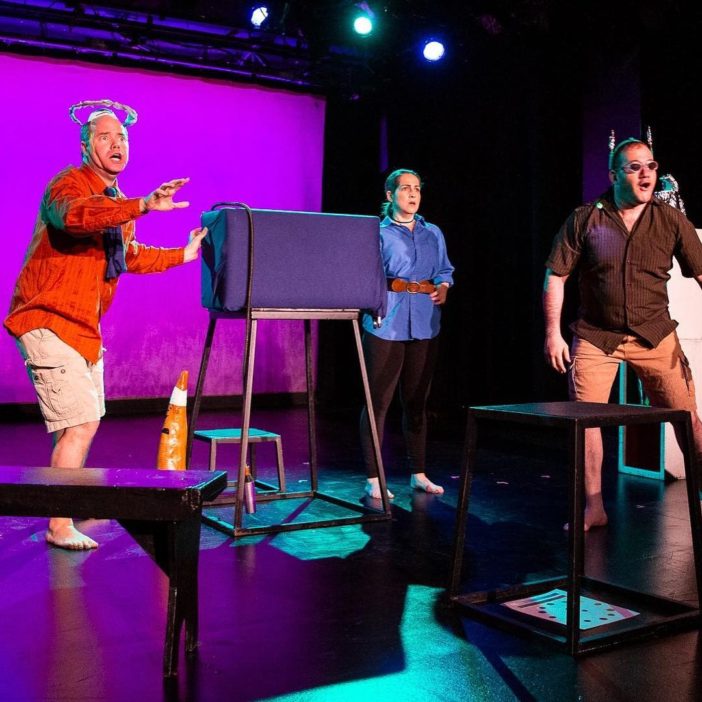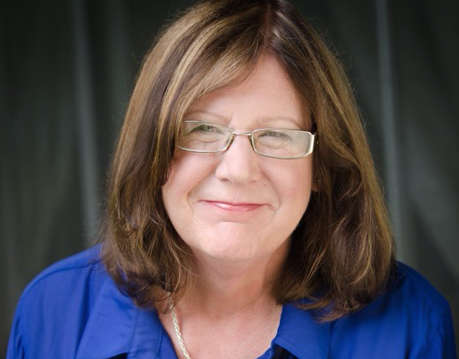Hi Claudia!! Thanks so much for chatting with me. So – First of all, how the heck are you? And, what’s your favorite thing to stress bake? For me lately, it’s a big wide stone fruit cake thing. I make it in a big wide curvy cake pan I bought at Ikea and I pretend I’m in Sweden. It’s nice. You?
Hi Rachael. Covid is one big curve, isn’t it? Waving at neighbors, living in the backyard (and grateful for the yard) and seeing the same six people we’ve been seeing since lockdown. I miss family gatherings. I loved baking for those. I am not too much of a stress baker – I just always baked. Pretty seasonally (very Italian of me). Berry pies in the summer, apple cakes and pies in the autumn… caloric-laden-very-fatty sweets to ring in the New Year. It’s funny you should mention Sweden. Last year on the North Shore (the shore of Lake Superior in northern Minnesota affectionately known as “The Norwegian Riviera”), I bought a baking book: Scandikitchen: Fika & Hygge by Bronte Aurell and have been cooking non-stop from that. Your pan reminds me of the pan desired for the Cloudberry and White Chocolate Cake. Don’t cloudberries sound heavenly? I have yet to find them but maybe one day when Americans are allowed to travel, that will be a new mission for me. I’ve made the simple and the fussy. I love the names of the cakes, “The Sylvia Cake,” “Success Cake,” “Blueberry Studmuffins.” But they’re all meant to be shared. I miss sharing. What do you make with your pan? And I believe you have family at home to gobble it up?
RC: Okay, I’m Norwegian American and I have more family in Norway than in the U.S. and I know cloudberries and they are worth the hype. Their texture’s amazing, like a soft peach with a light, citrusy sweet flavor. They’re so good! In Norway, people will return year after year to their mølte berry patches that only they know about. Like, they’ll write it into their wills, where to go find them. They grow up in the mountains, above the tree line. They’re the best. I’m so lucky to have picked them, and my kids, too. We went to Norway in 2016, so they could meet their cousins. It’s a continuous family connection that’s been unbroken since my grandfather moved to this country as a boy. He promised to stay in touch – And fortunately, they all did. 100+ years later, we are all in close communication. The night after Trump won, I got the best message from my cousin Sigurd. He simply wrote: “Do you want us to put the heat on for you in the basement?” He knew. They knew. Their country had been occupied. They saw the fascism from the other side of the earth. Now – I can’t wait to be able to get there again. First thing, drive to the mountains. Eat some mølte! Now we just sit in our yards and reminisce. Glad we have lots of travel to remember. How ‘bout you: Are you living in the present? Or do you, like me, feel kind of caught between the past, pre-Covid, and the future, like if and when theatres will come out of suspended animation?
CH: Working in theatre makes you live in the present, doesn’t it? And in the future. You write during the “here and now” and edit. And then you submit – giving you a glimmer of hope that something will be accepted in the future. I miss submitting. Because I write in youth theatre, there’s little to submit to right now. All conferences and residencies have been put on hold for a year, and all productions are cancelled or postponed. One year ago, Paul and I had many plans for the Summer of 2020. He retired August 1 and all our best laid plans will not happen. I wrote a play with Eva Schloss about her brother’s paintings that he did in hiding from the Nazis. We had several wonderful visits. Last October she was in Minnesota, spent the day at our home and Paul and I made plans to visit her in London September 2020. She was enthusiastic about showing us her part of London. Then we would be off to Cornwall. I spent my tween years reading Gothic novels and they all took place on the wild and wooly coast of Cornwall and I’ve always wanted to take my imaginings there. Have you ever been? It’s been on my list forever.
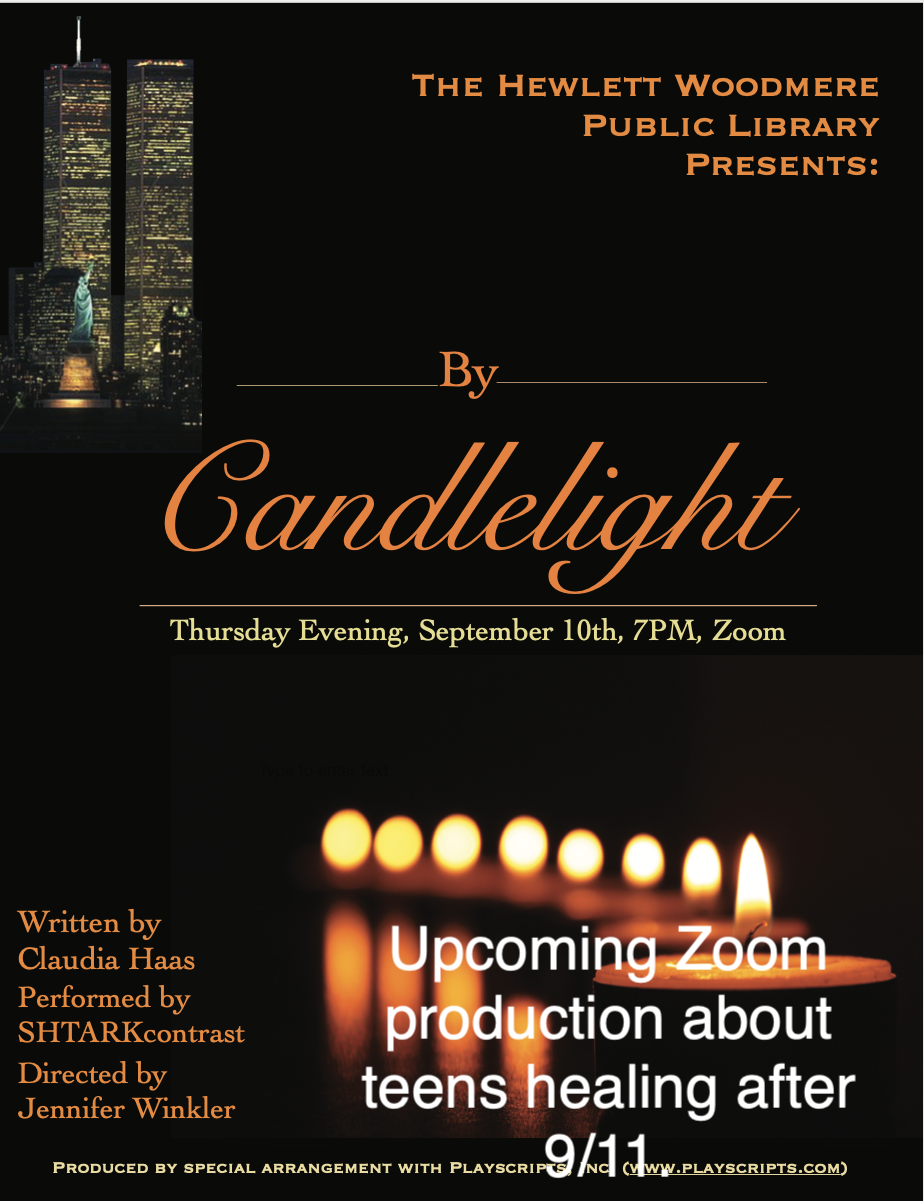
Then there’s the play with Eva. It was supposed to premiere March 2021. Eva planned on flying in for talk-backs about her years living in hiding and the ramifications of hate. Of course, that is on hold. Time is a precious thing and nobody knows how long we have. Paul and I are in our sixties. Eva is 91. She was on the West Coast of the USA giving talks on peace and tolerance when COVID hit. She made it home safely and she writes me that her children have had her “on house arrest” ever since. The loss of one year – no matter where you are in life has been difficult for everyone. It’s the loss of time with people you care about that you cannot get back. We supplement the sadness with gratitude conversations. We are healthy. We stay home and wear masks when out. We live in hope that this ends and we’re all still here. To write. To play. To search for cloudberries.
RC: I miss travel so much, and I miss the anticipation of travel maybe even a little more. I’m a planner, needing to descend upon my destination armed with a trivial knowledge rivaling any travel book and a physical gumption requiring little rest, food or shade. I subscribe to the “Get there early” and “do everything” tourist plan, unlike my dear husband, who enjoys the pleasure of a good tarry far more than I do. That said, we so enjoyed our holiday together last spring to London and exploring the English countryside. We were there ostensibly to see a reading of my play CANOPY in Cambridge, as part of the WriteOn Festival. Really, we were there to be together for the first time out of the country since we had kids. London is such a wonderful city. We were there in April and it was bursting with springtime flowers and life. Then we did a breakneck tour of Cambridge, Oxford, Bath, Stonehenge, Sussex and skittering down to Brighton, all by car, all driving on the left, all having a minor heart attack at this or that privet hedge or stone wall or house or sheep or fox or roundabout. It was great fun.
I would love to see Cornwall – Your trip must happen one day, and I know it will. I’ve read all those creaky stories, too, and delight in their musty parlor vibe. I just did a million hours of research on Mary Shelley before Covid, but haven’t had the heart or the will to tackle a project on her right now. Too much death and uncertainty swirling around, although that’s certainly what she was living with in her contemporary life and world. It’s fun to imagine the twinkling Georgian manor homes of Austen next to the sinister gothic piles in the books we kinda love…
Are novels an influence for your writing now? With your youth plays, I know you draw lines to history. I’ve read a number of your plays that focus on real people, contextualizing them in narratives that can be playful, relational, creative – that take flight with time and space, character, plot. Tell me about that space, of bringing the past to life, and why do you think plays work well, as a medium for communicating history to children and youth?
CH: Travel feeds my love of history. There’s something about being “at the place where it happened” that takes away the dry-textbook aspect of it and brings it to life. Sophie Scholl’s memorial in Munich shook me. There, outside of the University of Munich where she was arrested, there is a memorial of the pamphlets she helped produce interspersed with photos of all of the White Rose Society members. I looked at those young faces – university students – trying to bring down the Nazi government – and I wondered, why didn’t I learn about them? These young people lost their lives trying to bring attention to Nazi atrocities and I had only seen brief mentions of them here and there. (Yes, they are studied in Germany but even that took decades.) The day after returning home from Germany, I wrote Antigone in Munich. I received help from people at the University of Munich – there’s a lot of misinformation on the internet! And wrote nonstop for weeks. It was a mission.
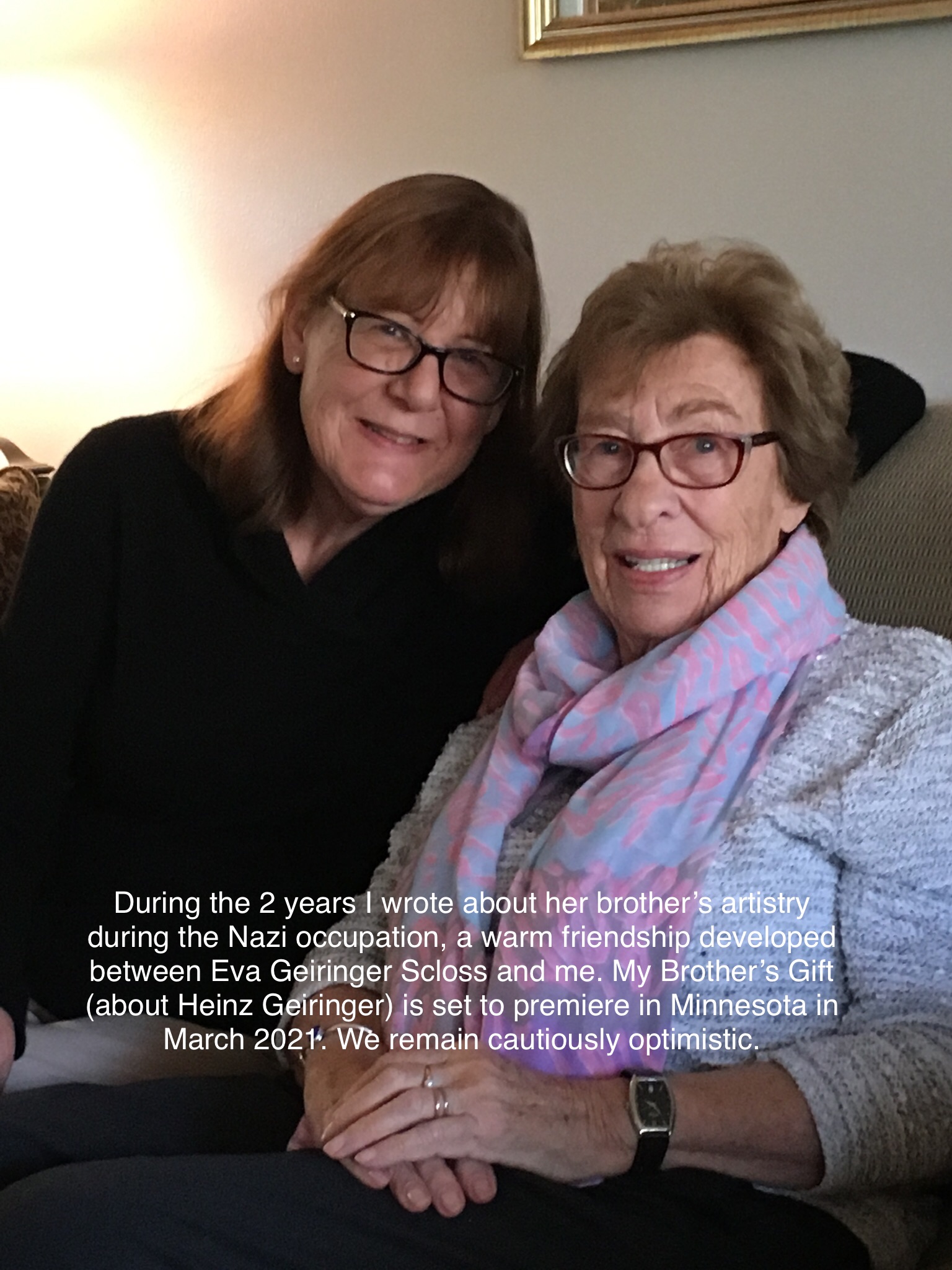
And then there are the newspaper articles. My play about Mary Anning (paleontologist) was from a news article. When you see that a thirteen-year-old young girl made a huge discovery in 1812 and then was ignored in the science books for over two hundred years, I pay attention. Similarly, my play about Anne Frank’s pen pal in Iowa was from a BBC article. I was able to visit the town in Iowa where Anne had her pen pal (Juanita Wagner) and talk to people, visit their little museum and dig deeper into Juanita’s life. Juanita’s childhood was not easy but it was in stark contrast to what Anne was going through under the Nazi occupation.
At the museum in Iowa, Eva Geiringer Schloss had donated replicas of her brother’s paintings that he created in hiding. Heinz Geiringer’s paintings stuck with me. How can you self-teach yourself art while hiding from the Nazis? There was no correspondence course. And through the paintings, I could see not only his artistry develop, but watched Heinz grow into an observant, thoughtful young man. His paintings alternate between hope and despair and I just wanted to reach out to him. I did reach out to his sister and as stated above, the paintings were the backbone of another youth play, My Brother’s Gift.

All the plays feature these remarkable people as children. I think young audiences relate quickly to another young person onstage. Whether it’s Mary Anning’s determination at age 13 to discover fossils or Heinz Geiringer working to better himself while in hiding from the Nazis, young people can relate to their resolve. A young person is not “on hold” to start their life at age twenty. Obstacles are everywhere. And so is creative thinking. Sophie Scholl went to talks and meetings to learn about her government. Mary Anning chipped away at the Lyme Cliffs in England to find her fossils. Anne Frank had her diary. Heinz Geiringer wrote poems and painted. I wish I had seen more young people on stage growing up. And so now I make sure I make time to write what I wish I had seen.
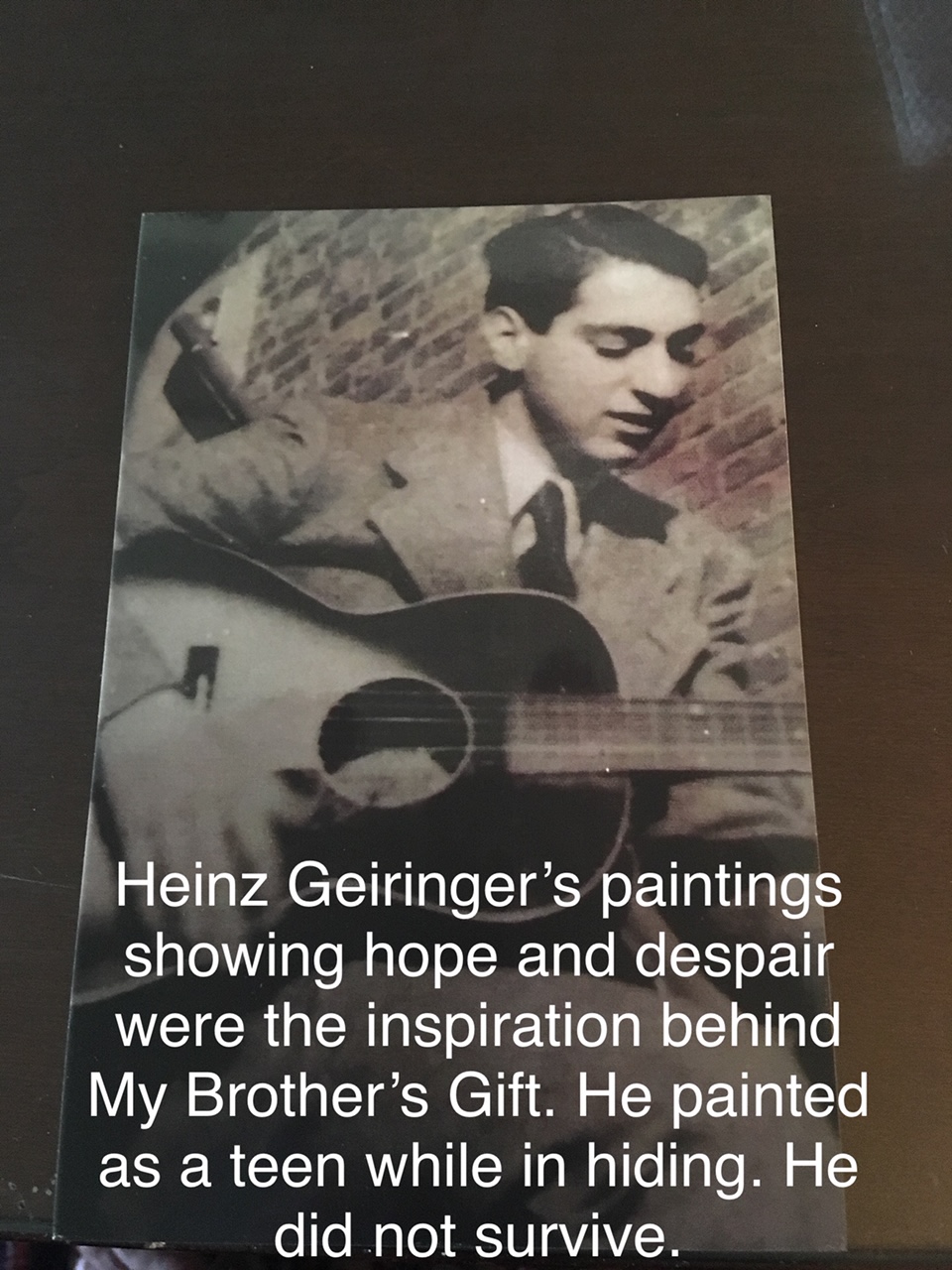
RC: These themes — Of youth overcoming societal expectations, oppression, occupation — can be seen throughout your work, and I’m so glad I’ve had the chance to read a lot of your plays. So, tell me, what makes a solid ‘Youth Play’? And how do you write for young audiences?
CH: A solid “Youth Play” is really the same as a solid play for adult audiences. What differs is the world of the play. You have to look at the age group and understand their world. A play about Nazi Germany will not resonate with K-2. That is out of their scope. That is why residences and conferences for theatre for young audiences have separate slots for Grades K-2, 3-5, 6-8 and high school. One play cannot possibly fall into all of those categories. Children grow and develop at astonishing speed. At a young age, they could be fascinated by the natural world, good vs. evil, or magical occurrences and by grades 6 they could be starting to look at social issues. When choosing to write a play for the young, really give some thought to the age range of the audience. Can they connect to this material? Will they care about the outcome? Children deeply care about the outcome. They invest their heart and soul in a story and their characters. Oh! And now there’s “Baby Theatre.” That’s a whole new ballgame. It’s a sensory introduction to theatre.
RC: I need to know more about “Baby Theatre”! – Is that like the live version of My Little Pony I saw when my kids were small, that was an existential pastel horror show with hooves? I’m just being silly, but your thoughts on developmental age groupings are interesting. We don’t think about that with adult audiences, though they differ wildly, too, don’t they? The demographics vary. That might not influence my writing, but it does influence what I send where. And I really resonate with what you’re saying about what younger audiences are ‘ready’ for – although that varies, too. I remember when I was a teaching artist in the schools, I couldn’t believe how many really young kids had seen really gory TV and movies. With omnipresent screens, tablets, phones, etc, how does theatre still entrain young hearts and minds? And why is it important?
CH: Ha! I don’t think that live version of My Little Pony would fly at a theatre dedicated to young audiences! Live theatre is so immediate. You watch the characters go through obstacles, inner and outer conflicts, changes, growth, right in front of you. There are no barriers. No screens. You are in their world. I love the study that was done that found “audience hearts synchronize while watching live theatre.” Their hearts literally beat together and their pulses speed up and slow down together as the story unfolds. That coming together cannot be overestimated in our growth as humans. One huge bonus in writing for teens: letters and emails telling you how a play of yours affected their life in a positive manner. That just may be the pot of gold at the end of a rainbow.
